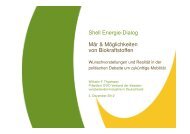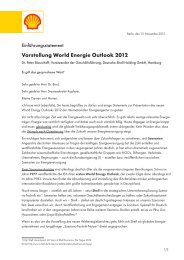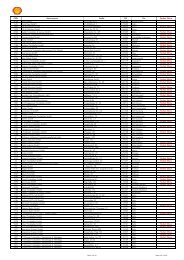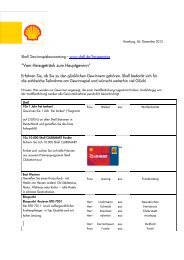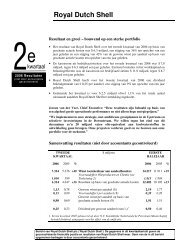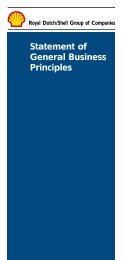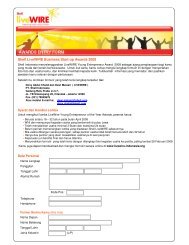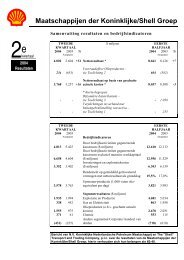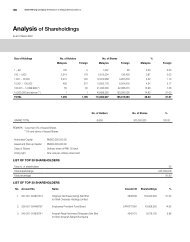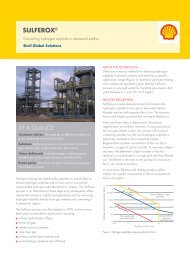62414 sustain 40pp (Mag)
62414 sustain 40pp (Mag)
62414 sustain 40pp (Mag)
Create successful ePaper yourself
Turn your PDF publications into a flip-book with our unique Google optimized e-Paper software.
RESPONSIBLE ENERGY<br />
Living by our principles<br />
The Shell General Business Principles<br />
were created 30 years ago and continue<br />
to define what we stand for and how we<br />
behave. In 2006, we launched a common,<br />
company-wide Code of Conduct to<br />
provide more detailed guidance on the<br />
behaviour our Principles require.<br />
Behaving with integrity<br />
Integrity is one of our three core values and<br />
a cornerstone of our Business Principles. We<br />
translate this value into action with a clear and<br />
simple policy: zero tolerance of bribes and fraud.<br />
In some parts of the world our policy banning<br />
bribes runs counter to common practice.<br />
Getting employees to comply requires extensive<br />
training and monitoring.<br />
According to our internal questionnaire of<br />
the most senior Shell representative in each<br />
country, in 2006, staff in over 100 countries<br />
attended sessions on the proper use of<br />
intermediaries in business transactions<br />
(more on this data page 37).<br />
To help us follow our Business Principles,<br />
employees are provided with online and<br />
face-to-face training in key areas, including<br />
preventing bribery and corruption.<br />
20 THE SHELL SUSTAINABILITY REPORT 2006<br />
We introduced a global help line and website in<br />
2005, and have rolled it out country by country.<br />
In a number of countries, it replaced local help<br />
lines that had been in place for many years.<br />
The new global facility is available 24 hours a<br />
day and allows employees and business partners<br />
to seek advice and report concerns (anonymously,<br />
if desired) about suspected incidents of bribery<br />
and fraud and other violations of our Code of<br />
Conduct and Business Principles. We report<br />
cases of bribery and fraud to the Audit<br />
Committee of the Board of Royal Dutch Shell<br />
plc. In 2006, 96 violations were reported. As a<br />
result we ended our relationship with 143 staff<br />
and contractors.<br />
Every two years, the Shell People Survey<br />
(page 25) includes questions to employees<br />
about whether their part of Shell is dealing<br />
with the outside world with integrity. In the<br />
2006 Survey, 81% of staff said it was. Four per<br />
cent said it did not. This is in line with scores<br />
since the Survey began in 1999, including in<br />
2004, after the recategorisation of our proved<br />
oil and gas reserves.<br />
Contractors<br />
Contractors are expected to follow our, or<br />
equivalent, business principles when working<br />
for us. In many locations, we work with<br />
contractors to help them understand and apply<br />
COMPETITION LAWS<br />
In June 2006, Shell Italia and Shell Aviation<br />
were fined more than €56 million by the Italian<br />
Competition Agency for allegedly exchanging<br />
information through airport joint ventures.<br />
These fines were reduced later in the year to a<br />
total of €37.64 million. In October 2006 in<br />
Argentina, we were accused of market sharing in<br />
Liquefied Petroleum Gas and fined approximately<br />
$83,000. We are appealing these cases.<br />
In 2006, we were fined €108 million for<br />
participating in a cartel in the Dutch bitumen<br />
market. The European Commission (EC)<br />
found that Shell and 13 other companies fixed<br />
prices from the mid 1990s until early 2002.<br />
The employee involved retired from Shell<br />
before the investigation began.<br />
The EC also fined us €161 million last year for<br />
participating in a synthetic rubber cartel between<br />
1996 and 1999. We sold the business involved<br />
in 1999. The EC investigation began in 2003.<br />
these principles. When they cannot, we are<br />
required to review the relationship up to and<br />
including cancelling the contract. In 2006,<br />
we cancelled over 40 contracts because of such<br />
concerns, according to our annual internal<br />
questionnaire of senior Shell country<br />
representatives (more on this data page 37).<br />
For example, multiple contracts were cancelled<br />
in Brazil, Canada, Nigeria, Trinidad and<br />
Tobago and the USA.<br />
Political activities and public advocacy<br />
Our Business Principles allow and encourage<br />
us to contribute to debates on important policy<br />
issues that affect our business, our employees<br />
or the local communities where we operate<br />
(see box). The Principles prohibit payments by<br />
Shell companies to political parties. This is to<br />
avoid Shell companies buying or being<br />
perceived to be buying favours. According to<br />
our annual internal questionnaire (see page 37),<br />
we made no payments to political parties or<br />
campaigns in 2006.<br />
Like many other corporations in the USA,<br />
Shell Oil Company administers a political<br />
action committee (Shell Oil Company<br />
Employees’ Political Awareness Committee).<br />
It is a voluntary, employee-run and employeefunded<br />
organisation, that contributes money to<br />
political parties or individual candidates for<br />
As the head of our downstream business, Rob<br />
Routs, emphasised to all his 73,000 staff last<br />
year after the bitumen and rubber cartel<br />
decisions were announced: “Infringement of<br />
competition law will not be tolerated in Shell.<br />
My position on this is unequivocal. If you<br />
engage in illegal discussions with competitors,<br />
you will face disciplinary action up to and<br />
including dismissal”.<br />
Since the mid-1990s, we have run an extensive<br />
training programme to help employees follow<br />
competition laws and are working hard to<br />
strengthen the culture of compliance. Obeying<br />
competition laws is an essential part of our new<br />
Code of Conduct. Our Global Antitrust<br />
Compliance Programme has been strengthened.<br />
Anyone in contact with competitors, suppliers or<br />
business customers is required to take training.


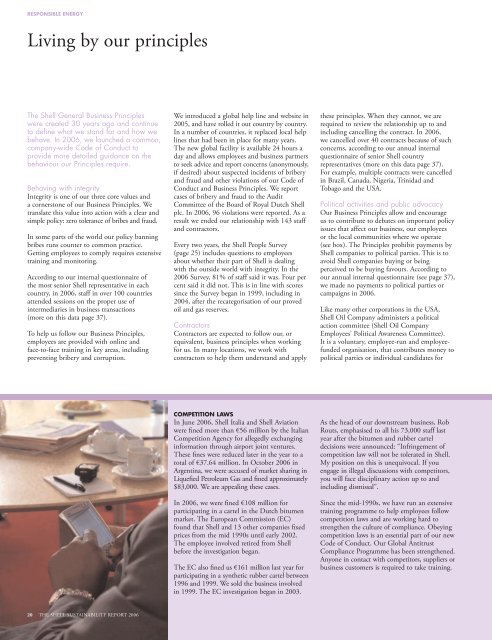

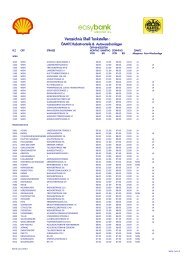
![Download Shell AutoGas Stationen [Stand: Januar 2013] (PDF](https://img.yumpu.com/9982753/1/190x245/download-shell-autogas-stationen-stand-januar-2013-pdf.jpg?quality=85)
